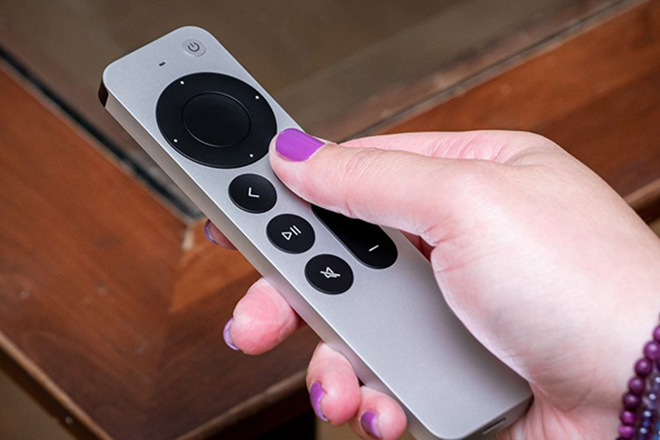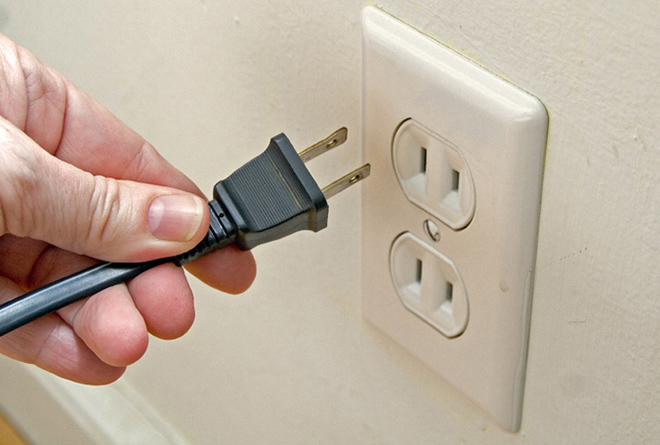Nowadays, many families use a variety of adapters – devices that convert voltage between electronic devices using 220V power to lower DC voltage – to power their devices. Some devices that commonly use adapters include laptops, smartphones, cameras, and even TVs.
Should I unplug my TV to save electricity?
Saving electricity is always on many people's minds when it comes to electronic devices, but does unplugging the TV when not in use meet expectations?
Many people have a habit of unplugging their TV to save on electricity consumption, as leaving it on standby mode with the remote means it still consumes a certain amount of power. In addition, unplugging the power cord provides peace of mind for families concerned about the potential risks of fires or accidents, especially those with young children.
However, if you think this action will save electricity, you are mistaken because it does not fully save electricity and can even reduce the lifespan of the device when unplugging the TV frequently.
To illustrate this, let’s conduct a simple experiment. Using a power consumption measuring device, after turning off the TV with the remote, after about 10 minutes of being turned off, the power consumption will decrease from 200W to 1.8W. This figure shows that the power consumption of a TV when plugged in but not turned on is very low. With a power consumption of 1.8W, when connected continuously for a month, the TV will only consume 1.29 kWh (or 1.29 units of electricity).

Let’s calculate this based on the current electricity prices, the lowest being 1,678 VND/kWh and the highest being 2,927 VND/kWh. We will spend about 2,165 VND to 3,775 VND per month when not unplugging the TV. This means that the power consumption when the TV is plugged in but not turned on is not too high.
In addition, plugging in the TV also provides excellent protection for your device as unplugging the power gradually affects the lifespan. This action will make the power supply to the TV unstable due to continuous charging.
In addition, if users unplug the cord abruptly without turning off the TV first, it can cause the plug or socket to be damaged, increasing the risk of fires or accidents.

How should you turn on/off your TV properly?
Although unplugging the power cord for the TV can save some electricity, it is not to the extent that we have to trade off the lifespan of the TV. In addition, under normal voltage conditions, turning off the TV with the remote or the power button on the TV is still safe and not dangerous.
Therefore, if your family frequently uses the TV, it is recommended to turn off the TV with the remote, and if you are more cautious, you can press the power button on the TV. Remember to never turn off the TV by unplugging it abruptly. Instead, only unplug the power cord completely if your family does not use the TV for many days or in severe weather conditions such as thunderstorms, where it is safe to unplug the power. However, note that before unplugging the power cord, users must turn off the TV with the remote first.
Important Guidelines to Follow When Utilizing a Washing Machine’s Dryer Function
If you’re looking for ways to maximize the efficiency of your washing machine and dryer, we’ve got just the advice for you! Follow a few simple guidelines and you can increase the performance of your machines, save time and energy, and reduce noise levels. To get started, here’s a look at the best practices for using the dryer function of your washing machine!
Discover How Much Power Your Electronics Consume When Not In Use
Do you ever consider the amount of energy some of your electronics and appliances are consuming while you’re not even using them? With the amount of electricity being used each month, it’s important to find out how you can cut down on these costs. Let’s investigate some tips and tricks to help you save energy.
Increases in Energy Efficiency Achieved with Slow Cookers
As the demand for convenient cooking continues to rise, more and more families, especially those with young children, are turning to slow cookers as a way to create healthy and tasty meals with minimal effort. With so many settings and benefits, slow cookers offer a great solution for busy households.





































